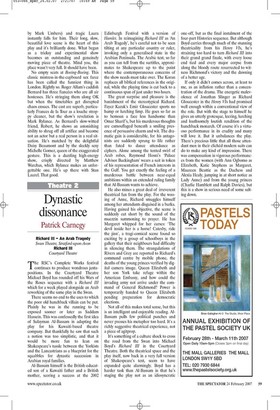Dynastic dissonance
Patrick Camegy Richard III — An Arab Tragedy Swan Theatre, Stratford-upon-Avon Richard III Courtyard Theatre The RSC's Complete Works festival continues to produce wondrous juxtapositions. In the Courtyard Theatre Michael Boyd has rounded off his Wars of the Roses sequence with a Richard III which for a week played alongside an Arab reworking of the same play in the Swan.
There seems no end to the uses to which the poor old hunchback villain can be put. Plainly he was in the running to be exposed sooner or later as Saddam Hussein. This was confessedly the first idea of Sulayman Al-Bassam in adapting the play for his Kuwaiti-based theatre company. But thankfully he saw that such a notion was too simplistic, and that it would be more fun to lean on Shakespeare's tussle between the Yorkists and the Lancastrians as a blueprint for the squabbles for dynastic succession in Arabian royal families.
Al-Bassam himself is the British-educated son of a Kuwaiti father and a British mother, scoring a success at the 2002 Edinburgh Festival with a version of Hamlet. In reimagining Richard III as 'An Arab Tragedy', he's careful not to be seen tilting at any particular country or ruler, invoking only a generalised state in the Arabian Peninsula. The Arabic text, so far as you can tell from the surtitles, approximates to Shakespeare up to the point where the contemporaneous concerns of the show needs must take over. The Koran replaces all biblical references in the original, while the playing time is cut back to a continuous span of just under two hours.
The great surprise and pleasure is the banishment of the stereotypical Richard. Fayez Kazak's Emir Gloucester sports no hump or lurching limp He goes so far as to bemoan a face less handsome than Omar Sharif's, but his murderous thoughts are camouflaged beneath a smiling presence of persuasive charm and wit. The dramatic gain is considerable, for his antagonists are suddenly sprung to life rather than fated to dance attendance as ciphers. Alone among the tented swirl of Arab robes, Raymond Hosni's 'Palace Advisor Buckingham' wears a suit in token of his representation of French interests in the Gulf. You get exactly the feeling of a murderous battle between near-equal ambitions within an extended ruling family that Al-Bassam wants to achieve.
He also mines a great deal of irreverent theatrical fun from the play. For the wooing of Anne, Richard smuggles himself among her attendants disguised in a burka. Having gained his objective, the scene is suddenly cut short by the sound of the muezzin summoning to prayer. He has Margaret whipped for her curses: 'The devil inside her is a horse! Catesby, ride the jinn', a tragi-comical scene found so exciting by a group of schoolboys in the gallery that their neighbours had difficulty in silencing them. The strangulations of Rivers and Grey are reported to Richard's command centre by mobile phone, the deaths of the young princes verified by digital camera image. Queen Elizabeth and her son York take refuge within the American Embassy, and how could the invading army not arrive under the command of General Richmond? Power is temporarily handed to Queen Elizabeth pending preparation for democratic elections.
Not all of this makes total sense, but this is an intelligent and enjoyable reading. AlBassam pulls few political punches and never presses his metaphor too hard. It's a richly suggestive theatrical experience, not a piece of agitprop.
It's something of a culture shock to cross the road from the Swan into Michael Boyd's Richard III in the Courtyard Theatre. Both the theatrical space and the play itself, now back in a very full version of Shakespeare's text, seem to have expanded quite alarmingly. Boyd has a harder task than Al-Bassam in that he's staging the play not as an idiosyncratic one-off, but as the final instalment of the four-part Histories sequence. But although Boyd carries through much of the stunning theatricality from his Hemy VIs, he's straining too hard to turn Richard III into their grand grand finale, with every loose end tied and every major corpse from along the bloody route resurrected to witness Richmond's victory and the dawning of a better age.
If only it didn't comes across, at least to me, as an inflation rather than a concentration of the drama. The energetic malevolence of Jonathan Slinger as Richard Gloucester in the Hemy VIs had promised well enough within a conventional view of the role. But with the stage to himself he gives an utterly grotesque, leering, lurching and loathsomely loutish rendition of the hunchback monarch. Of course it's a virtuoso performance in its crudity and many will love it. But it unbalances the play. There's precious little that all those attendant men in their cliched modern suits can do to make any kind of impression. There was compensation in vigorous performances from the women (with Ann Ogbomo as Elizabeth, Katie Stephens as Margaret, Maureen Beattie as the Duchess and Alexia Healy, jumping in at short notice as Lady Anne) and from the young princes (Charlie Hamblett and Ralph Davies), but this is a show in serious need of some salting down.






















































 Previous page
Previous page